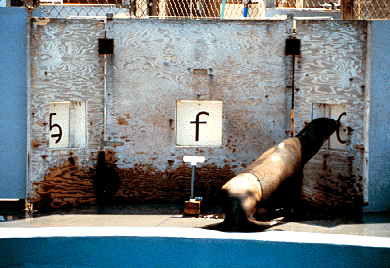![[Currents header graphic]](/homeart/currents_header.gif)
![[Currents header graphic]](/homeart/currents_header.gif)
August 18, 1997

|
|
Rio, a California sea lion, aces another exam that tests her cognitive skills
|
An apparatus that looks similar to the child's game "Concentration" has garnered the group much attention over the years.
Schusterman's coworkers train Rocky and Rio to match pairs of pictures, exposed within small windows in a poolside wooden frame. For each correct pairing (identified by the sea lion with a touch of its nose), the animal gets a fish. We see each symbol as a letter, or a flower, or a teapot--but to the sea lions, they're just random shapes.
Once the animals learn many pairings, the researchers examine what choices they make when given new combinations. If "A" goes with "B," for instance, and "B" goes with "C," would the sea lions deduce instantly that "C" goes with "A"? About five years ago, the team demonstrated that at least one animal--Rio--could do this, and do it easily.
Many researchers had believed that spoken language was a prerequisite for this ability, called "equivalence." Instead, some animals may possess cognitive skills that linguists would regard as forerunners of language, even though the animals obviously are nonverbal.
More recent work, led by Reichmuth, has strengthened this conclusion by showing that Rio also can form "functional classes," another complex task. Rio learned to sort shapes, in this case letters and numbers, into different categories. After she mastered this skill, Rio immediately could relate the members within each class to one another. She also could expand the classes to include new letters and numbers.
These skills, the researchers claim, cannot stem simply from instinct or trial and error. Rather, it appears that more complicated thought processes are innate--at least to Rio, and perhaps to other members of her species as well.
Why should a sea lion have these abilities when it can't say out loud what it's thinking? It all boils down to problem solving in the environment, Schusterman believes. To survive, a lone pup among thousands on a beach must recognize its mother across the different senses of sight, smell, and sound--and vice versa. Adults must classify their kin, recognize which predators to avoid, and navigate in three dimensions. The skills they've found in Rio, the group maintains, could form the basis of a cognitive mechanism that sea lions use to cope in the wild.
"You'd be hard pressed to think of any problem in your life that doesn't require you to use language to solve it," said marine biologist David Kastak, who earned his Ph.D. in Schusterman's group. "Other animals are solving similar complex problems, but without language."